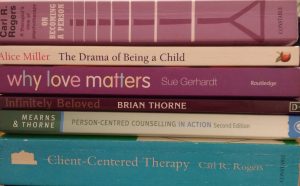 ‘Things fall apart; the centre cannot hold;/ Mere anarchy is loosed upon the world’… I find myself thinking that a lot, these days. How fortunate I am, then, to have a job which acts as an antidote to despair and fear. I write thing 33 in celebration of the joys of being a person-centred counsellor.
‘Things fall apart; the centre cannot hold;/ Mere anarchy is loosed upon the world’… I find myself thinking that a lot, these days. How fortunate I am, then, to have a job which acts as an antidote to despair and fear. I write thing 33 in celebration of the joys of being a person-centred counsellor.
It’s true that washing up, vacuuming and ironing are three activities which only become interesting when the alternative is writing up my client notes. Never mind that notes are an essential part of the work, being a place to reflect, self-supervise, allow feelings and ideas to come to the surface, get a meta position on the work… Meh. As Holden Caulfield might have said, I’ll procrastinate the hell out of things for as long as I can before surrendering to the inevitable and (of course) finding the process less time-consuming and more interesting than I’d feared. You know how it goes.
But the notes, and the fact that I work from home and therefore have regularly to clean and tidy the house—or, let’s be honest, corral any mess/filth into non-client areas—are really the only toads which squat on my working life. I’ll never be well-off in financial terms, but I do consider myself rich, because my work is wonder-full.
Person-centred therapy has at its heart what Carl Rogers, the original Big Cheese of person-centredness, called the core conditions: empathy, congruence and unconditional positive regard; or in other words, compassionate understanding, honesty and acceptance. I mean compassion in its original sense of suffering with (com=with, passion=suffering) and acceptance as in acknowledge what is, rather than (necessarily) like. It’s not about trying to “fix” or change people, but about receiving them where they are, in the trust that this will facilitate growth and change. I’m definitely not claiming I can offer this to all clients all of the time, but it feels like the right thing to aim for; these are, after all, the attitudes I want to be on the receiving end of. My work, then, allows me to inhabit a world whose values I can believe in, whatever my in-the-moment failures of execution. Strike 1 for despair.
And when people have the courage to allow me access to their worlds—all unique, and all of them wonderful, fascinating, terrible, beautiful, surprising—it feels like the most extraordinary privilege. I prize intimacy: not “intimacy” the cheesy euphemism for sex (sounds like something from a police report: “intimacy took place on the evening of the 15th…”) but intimacy as in being real, together. Whether it’s sorrow or rage or fear or joy, the experience and sharing of real feelings is one of the things that helps me know I’m properly alive, because it feels like the fullest possible contact with another human being. It’s the opposite of being alone.
 To be openly yourself, though, can be terrifying: after all, you’re showing the other person “the real you”, the one you probably fear isn’t good enough. And this feels like a rare if not endangered thing in our culture of social media and Being On Message. So the fact that I always have a small, plain candle burning in the client room during session is nothing to do with wafty aromatherapeutic intentions and everything to do with my belief that something special and sacred is happening here. Something calling for courage, and deserving of reverence. Strike 2.
To be openly yourself, though, can be terrifying: after all, you’re showing the other person “the real you”, the one you probably fear isn’t good enough. And this feels like a rare if not endangered thing in our culture of social media and Being On Message. So the fact that I always have a small, plain candle burning in the client room during session is nothing to do with wafty aromatherapeutic intentions and everything to do with my belief that something special and sacred is happening here. Something calling for courage, and deserving of reverence. Strike 2.
There is, obviously, a certain amount of gratification and validation for me in being found a worthy companion: I like it that people experience me as trustworthy and accepting of them, not least because it reminds me to trust and accept myself, too. But the rewards are about much more than ego stroking. To participate in a process by means of which people become, to whatever degree, freer, more easy in their lives and in their own skins, more self-accepting, more hopeful, contributes hugely to my sense of meaning and purpose in life. ‘“What do we live for, if it is not to make life less difficult for each other?”’ says Dorothea in (of course) Middlemarch. Working as a counsellor, I get to feel that I’m in the plus column of life (sometimes, at least!): my life has ripples which are positive. Strike 3.
And there’s more! Being in therapeutic relationships allows me to express parts of myself which would, I imagine, be involved in being a parent. I don’t mean by that a sort of fussy protective motherliness, nor is it about wanting to feel depended on, or necessary: though a client may pass through “needing” her/his sessions, it’s only en route to not needing them any more. CS Lewis describes this dynamic so well when he says of the maternal instinct, ‘the proper aim of [this] giving is to put the recipient in a state where he [sic] no longer needs our gift… We must aim at making ourselves superfluous’. Thus in my client work I get to exercise my capacity to hold, accept, encourage, respect, reflect, nurture, challenge, in relation to all sorts of people. I have the chance to foster—the verb is apposite—growth: to feel part of the process of life, of one person handing something on to another. It’ll never be the same as having my own children. But it is a very important something, nonetheless.
 The most profound wonder of all, though, about being a person-centred therapist, is something very hard to describe. I sense it often, but not exclusively, when a client and I are working at what is known in the biz as ‘relational depth’—that is to say, when we are in a state of connectedness and flow where words may not even be necessary and there is an intuitive, profound experience of understanding and togetherness and co-creation of meaning. In these times, and in moments when clients are finally able to grieve for their own great hurts and thus begin to heal from them, I experience a marvel-lous sense of relief, wonder and trust in the world—in the shape of human experience and relatedness.* And this is not about me, or any therapeutic clevernesses I might plume myself on. It’s deeper, and better, and more important than that. It’s a sense that the world is safe, in spite of our fears: that there is some trustworthy movement or force for good in the world. That the centre can hold, after all.
The most profound wonder of all, though, about being a person-centred therapist, is something very hard to describe. I sense it often, but not exclusively, when a client and I are working at what is known in the biz as ‘relational depth’—that is to say, when we are in a state of connectedness and flow where words may not even be necessary and there is an intuitive, profound experience of understanding and togetherness and co-creation of meaning. In these times, and in moments when clients are finally able to grieve for their own great hurts and thus begin to heal from them, I experience a marvel-lous sense of relief, wonder and trust in the world—in the shape of human experience and relatedness.* And this is not about me, or any therapeutic clevernesses I might plume myself on. It’s deeper, and better, and more important than that. It’s a sense that the world is safe, in spite of our fears: that there is some trustworthy movement or force for good in the world. That the centre can hold, after all.
A few weeks ago, I was listening to a client describing a shift in their (forgive the clumsy anonymising pronouns here) feelings towards a parent. Having endured many months of excruciating grief for the deep hurts of their childhood, the client was experiencing the beginning of liberation and healing—realising that they were, after all, a good-enough person, worthy of love. As I listened, I recognised the significance of what was being said a few moments before the client did, and my eyes filled with tears of joy and wonder. The client looked up at me, saw my joy, my caring for them and my delight in the wider process, and realised, themselves, the full import of what they were saying. Our eyes shone together for a moment, one to each other. Then the client leapt to their feet and we had a brief, intense, heartfelt, joyful, celebratory embrace.
That is beyond price.
Of course, there isn’t nearly enough love at work in the world. None of what I’ve said means that horror and cruelty and Wrong don’t exist, or makes any of the bad stuff ok. But I honour these reminders I’m given, that the opposite things exist too: kindness, goodness, compassion, joy, hope. Love.
And all I can say is: thank you.

You can read the poem from which this post’s title is taken here.
*And you can see a beautiful evocation of a moment of healing here, in this clip from Good Will Hunting.
Lucky clients, to find you!
Thanks, Meg x
Ah Lucy, I can really feel you in this account of your therapeutic work. It is so real and alive and the passion in what you say is … so uplifting.
I’m so glad it comes across, Sheila. Passionate is exactly what I am. I could have written so much about person-centredness… Thank you for letting me know it reached you, Sheila. I smile at you across the ether!